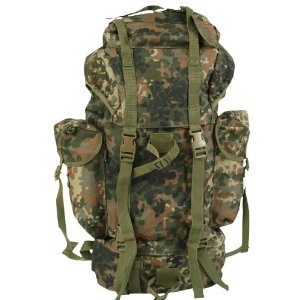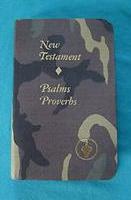This morning I met with my prayer group in our weekly effort to bring 200+ requests to God for his answers. Because we make an effort get the job done before morning moves into afternoon, we try to be efficient, though never sacrificing Spirit-led diversions from having their way.
We categorize according to illnesses, revival, church concerns, career problems, missions, community services, and more. We also pray for our government and for the military, including any in our congregation on active duty.
This morning as one of the ladies prayed about war zones and soldiers, my thoughts wandered to that familiar old aphorism, “There are no atheists in foxholes.” It originated in the 1940’s and implies that everyone who finds themselves under extreme stress will seek the help of a higher power.
Army rucksacks used to include pocket New Testaments as an encouragement toward that higher power, but in recent years they’ve been eliminated. Maybe there just isn’t room anymore, with everything else a soldier has to carry:
And that’s just the first 20 items. Depending on the mission, there might be many more. The goal is to protect our fighting men and women as thoroughly as possible, although the weight of these supplies often reaches 100 pounds.
But what if a soldier said, “All that stuff just weighs me down, so my plan is to leave it behind when I go into battle. I’ll be able to run faster and stay energized longer without that extra 100 pounds, which is a more sensible way to fight.”
We’d all argue against that, but in life’s spiritual battles, for those of us waging war against temptations every day, we often do exactly that. Ephesians 6 details a supply list that offers sure protection:
- belt of truth
- body armor of God’s righteousness
- shoes prepared with the gospel of peace
- shield of faith
- helmet of salvation
- sword of the Spirit
- the Word of God
When we lose a battle, we should immediately take inventory of our fighting gear. Did we forget to bring (or purposely leave behind) our protective equipment?
It’s a shame New Testaments have been eliminated from standard military supply, though the 20+ items soldiers do carry are sure to help them. But for those of us not currently in the military, it’s that same New Testament that contains the only effective supply list that will help us conquer our enemies day-to-day.
And it weighs far less than 100 pounds.
“We are not fighting against flesh-and-blood enemies, but against evil rulers and authorities of the unseen world, against mighty powers in this dark world, and against evil spirits in the heavenly places.” (Ephesians 6:12)






